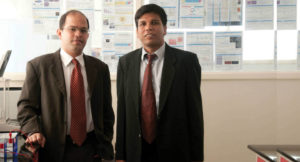Ravi Virmani, the former COO of Max Healthcare, often had friends reaching out to him to get their queries on healthcare answered. This helped him realize a key problem in India’s booming healthcare industry – lack of transparent information on doctor quality, pricing, etc. – and it nudged him to startup CrediHealth.
Despite the healthcare industry in India progressing in leaps and bounds on the technology front, it seems to have missed out on bridging one glaring, fundamental gap on the service and delivery front; establishing credibility be it of the doctor, of the hospital, of the fee structure and more. If you think about it, even today, many of us rely on word-of-mouth or referrals when it comes to availing healthcare and related services because the sector is fraught with malpractices. As Ravi Virmani, the former COO of Max Healthcare points out, “Today, 85 per cent of the Indians are not medically insured. Imagine their plight when they are made to pay 20 per cent extra for a service.” So, where is the solution to this problem? “When I was with Max Healthcare, every day, I used to get calls from people requesting me to refer them to the best doctors for varied services. Over time, I realized this was a vital need. I thought, why not make it available to everybody?” recalls he.
In early 2014, determined to eliminate this glitch in the system, Virmani got together with Saurabh Uboweja and Gaurav Gaggar to create a platform which lists the best doctors and healthcare centers in each city. They called it CrediHealth. “We founded this company with the goal of starting ‘The Right Cost Movement’ in Indian healthcare sector,” shares Virmani. The company designed a 12-point criteria to identify credible healthcare institutions from the rest, before signing them on the platform. Some of them include, an NABH/ JCI approval, a minimum of 100 beds in Tier I and 60 beds in Tier II cities, a multi-specialty hospital offering at least three specialties (Cardiology, Orthopedics, Nephrology, Urology, Gastroenterology or Oncology), quality of infrastructure, occupancy levels and more. Credihealth currently lists healthcare units only in metros with the belief that Indians still prefer to go to sophisticated hospitals. It’s present across Delhi-NCR, Mumbai, Kolkata, Bengaluru, Chennai and Hyderabad. “We typically list hospitals which are within the six-hour driving radius, so that people from the outskirts can also visit. Currently, 40 per cent of the traffic is from non-metros,” he cites. However, the company soon plans to tap into the Tier II markets and further penetrate into the Tier III segment in the next three years.
Let’s disrupt it
Credihealth offers end-to-end services for its customers (patients) in the regions it operates in. For example, if a customer wants to search for the best hospitals or doctors who can undertake a knee replacement surgery, he/she can visit the Credihealth website, go through the various options presented to them on the platform, take a second opinion, research about the ailment and the (recommended) doctors through the various research and interview-based articles posted on the site, consult Credihealth’s in-house doctors and take a call on the most suitable option for them. In fact, Virmani claims that the strategies which differentiate (and disrupt) Credihealth’s model from its competitors is their nature of partnerships, second opinion services, suitable discounts and premium content (medical articles, blogs, videos and more). In fact, its service delivery doesn’t end here. Credihealth also ensures that the patient is supported with the admission, surgery, post-op treatment and feedback from doctors as well. “Essentially the patient journey begins and ends with us,” notes Virmani and points out that these services are offered to the patients free of cost. “We don’t charge the patients. We present them with options and give them the required support to take decisions.” Instead, Credihealth takes a market development fee from the healthcare companies for bringing them business.
At present, the company records 2.50 lakhs site visits per month. By September 2016, it expects to reach 10 lakhs per month and by 2018, 50 lakhs per month.
Overcoming challenges
No doubt, it was a daunting task for the founders and their team to bring the initial set of customers on board. As Virmani states, “Some hospitals felt, when their business is in good shape, why do they need another facilitator to bring in fresh business? It took them time to realize that the industry is becoming more competitive, hence they need to change their product mix and identify new strategies to increase their profitability and market share.” The team faced similar challenges on the customer front as well, but what worked in their favor was the positive feedback and sustainable growth they recorded in the early stage.
On the marketing front, what typically works for Credihealth is a combination of word-of-mouth, social media and content marketing. According to Virmani, “Sixty per cent of the website traffic is organic, 30 per cent through repeat business and 10 per cent through direct sales on platforms such as Facebook, LinkedIn and SEO.” Credihealth has also created communities on Facebook (for specific health concerns) and brings together existing and potential customers to interact, share and view information on the platform. For example, the six-month- old ‘New Mom’s Club’ with 8,000 members has Q&A sessions with experts in this field.
Where’s the money at?
Although the company has largely been self-funded, it raised a seed round for an undisclosed amount from Hausela Capital Partners in the early stage, and a more recent undisclosed round in September 2015 from Rajat Malhotra, Director of Engineering at Twitter India. From the current round, 40 per cent will be reserved for improving technology, 50 per cent for marketing efforts and the rest for hiring.
With a current team size of 32, Credihealth has a clear plan laid out for the next three years. It wants to enter 15 cities across India and capture five per cent of the hospitalization market in each of these cities. “We want to look at every pain point of a patient in the non-clinical side, from admission to discharge to feedback, and be the foremost player in this segment. This is our value proposition,” he sums up.
Snapshot
Credihealth
Founders: Ravi Virmani, Saurabh Gaurav Gaggar
Year: 2014
Concept: A platform which lists quality healthcare and related services in cities and offers end-to-end healthcare support for patients who avail services through the website
Investors: Hausela Capital Partners and Rajat Malhotra, Director of Engineering, Twitter India
Did you know?
Each founder in Credihealth is a serial entrepreneur. While Ravi Virmani earlier founded Nobel House (before joining Max Healthcare), a human resources consulting firm, Saurabh Uboweja started a brand consulting and design firm called Brands of Desire and Gaurav Gaggar setup Adda52, an online poker and rummy website.




